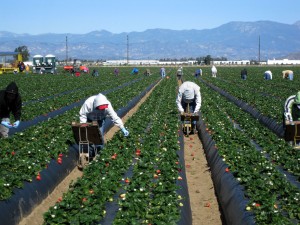Get the Facts about Farmworkers with New, Downloadable Slideshow
 Recently, two elderly farmworkers took the brave and very unusual step of suing their employer, an onion grower in the Coachella Valley, for violating the few labor laws that protect farmworkers. The two men were regularly paid less than the minimum wage, required by California law, never paid overtime, and not given protective equipment, said Megan Beaman, the attorney with California Rural Legal Assistance who filed the suit on their behalf.
Recently, two elderly farmworkers took the brave and very unusual step of suing their employer, an onion grower in the Coachella Valley, for violating the few labor laws that protect farmworkers. The two men were regularly paid less than the minimum wage, required by California law, never paid overtime, and not given protective equipment, said Megan Beaman, the attorney with California Rural Legal Assistance who filed the suit on their behalf.
Such practices are common in our nation’s fields. Since many farmworkers are undocumented immigrants, and afraid to speak up, the violations go unreported. As Tracie McMillan writes in her new book, The American Way of Eating (for which she worked undercover in produce fields, two Walmarts, and an Applebee’s), even if a company is caught adjusting a worker’s actual hours downward, so that it looks like they paid her minimum wage instead of a much lower piece rate, the fine is around $350. Tracie herself lost out on about $500 for one month of picking. Growers thus have a strong economic incentive to cheat workers.
California is one of the few states that require farmworkers to be paid the minimum wage. Farmworkers are exempt from most federal labor laws. These gaps were detailed in the Inventory of Farmworker Issues and Protections in the United States, a report released in March 2011 by a unique for-profit/NGO joint venture of the Bon Appétit Management Company Foundation and the United Farm Workers, with support from Oxfam America.
Nonprofits and reporters, including Tracie, have been using the Inventory as a one-stop resource for facts and figures about this critically important yet undervalued workforce. (Download the PDF of the full report.) In honor of this year’s Farmworker Awareness Week, Bon Appétit Management Company Foundation Fellow Vera Chang combined some of the Inventory’s key statistics with photos, artwork, and music into a slideshow that can be used for educational purposes. You can watch it on YouTube, below, or download the full-quality, 100-MB MPEG-4 version for use in presentations.
We have made this available in the hope that the more awareness that people have about farmworkers, the fewer employers who will think that exploiting them is just an affordable cost of doing business.
Cross-posted from the Rural California Report